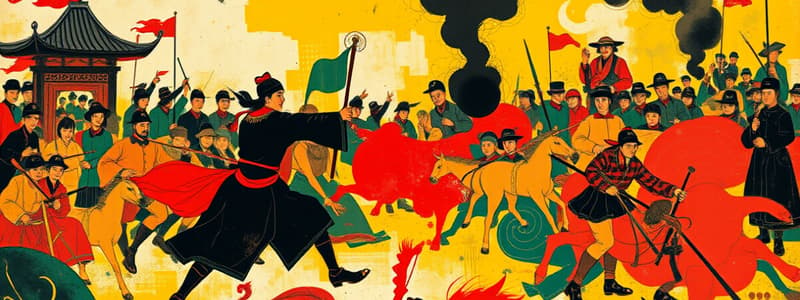Podcast
Questions and Answers
What were the two armed conflicts in China in the mid-19th century known as the Opium Wars fought between?
What were the two armed conflicts in China in the mid-19th century known as the Opium Wars fought between?
- China and United States
- China and France
- China and Japan
- China and Britain (correct)
What religious group led the Taiping Rebellion?
What religious group led the Taiping Rebellion?
God Worshipping Society
What was the result of the Boxer Rebellion?
What was the result of the Boxer Rebellion?
- China won and gained territories
- China agreed to pay reparations (correct)
- Western powers were defeated
- It ended without any consequences
Who was the Empress Dowager of China during the Qing dynasty?
Who was the Empress Dowager of China during the Qing dynasty?
What was the main title held by Pu Yi?
What was the main title held by Pu Yi?
In which years was the Chinese Republic established?
In which years was the Chinese Republic established?
What are the three principles of Sun Yat-sen?
What are the three principles of Sun Yat-sen?
What period is known as the Warlord Era in China?
What period is known as the Warlord Era in China?
What significant event began during the Long March?
What significant event began during the Long March?
Flashcards are hidden until you start studying
Study Notes
Opium War (1839-1842)
- Two armed conflicts involving Western powers and the Qing dynasty.
- First Opium War (1839-42) primarily between China and Britain, second (1856-60) involved Britain and France.
- Victorious foreign powers gained commercial privileges and territorial concessions.
- Began era of unequal treaties undermining Qing sovereignty, leading to the dynasty's fall.
Taiping Rebellion
- Revolt from 1850 to 1864 against the Qing dynasty based on religious conviction and economic strife.
- Led by Hong Xiuquan, founder of the God Worshipping Society.
- Seized control of Nanjing for a decade, resulting in over 20 million deaths.
- Ultimately failed to establish a lasting regime or replace the Qing.
Boxer Rebellion
- Uprising in 1900 led by the Society of the Righteous and Harmonious Fists against Western and Japanese influence in China.
- Boxers targeted foreigners and Chinese Christians, destroying property.
- Beijing besieged until international forces quashed the uprising.
- Aftermath included China agreeing to pay over $330 million in reparations under the Boxer Protocol.
Empress Dowager of China
- Cixi, originally a low-ranking concubine of Emperor Xianfeng, became a significant political figure.
- Her son, the Tongzhi emperor, was thrust into power at age six following Xianfeng's death.
- Orchestrated a coup to take control from the regency council, ruling effectively with Ci'an and Prince Gong.
Pu Yi
- Last Manchu emperor, assumed the throne in 1908 at age two.
- Despite a republic being established in 1911, allowed to retain his title in a mock-imperial lifestyle.
- His life symbolized the transition from monarchy to republicanism, as he lived surrounded by courtiers unaware of significant political changes.
Chinese Republic (1911-1912)
- Formed in 1912, replacing the imperial system with governance by the Nationalist Party.
- Continuation of the Republic occurred in Taiwan post-1949 after Nationalist defeat by Communists.
Sun Yat Sen's Three Principles
- Nationalism: Promoting Chinese sovereignty and unity.
- Democracy: Advocating for a government accountable to the citizens.
- Livelihood: Ensuring economic well-being and equitable distribution of resources.
The Warlord Era
- Period from 1916 to mid-1930s characterized by military cliques controlling various regions after Yuan Shikai's death.
- Marked by the Chinese Civil War beginning later in this era.
- Nominally ended in 1928 with the Northern Expedition, although warlord influence persisted into the 1930s.
The Long March
- Commenced in October 1934, a strategic retreat by the Chinese Communists fleeing Nationalist forces.
- Covered approximately 4,000 miles over a year, highlighting the resilience of Communist fighters.
- Solidified Mao Zedong's leadership within the Communist Party, setting the stage for future power struggles.
Studying That Suits You
Use AI to generate personalized quizzes and flashcards to suit your learning preferences.




